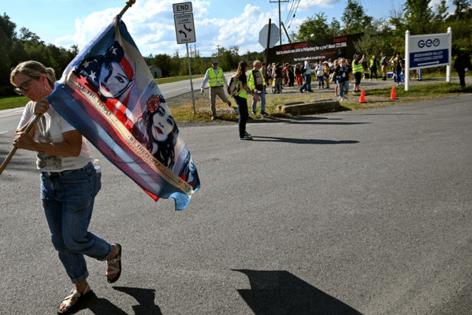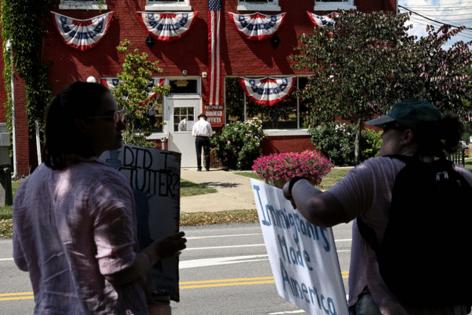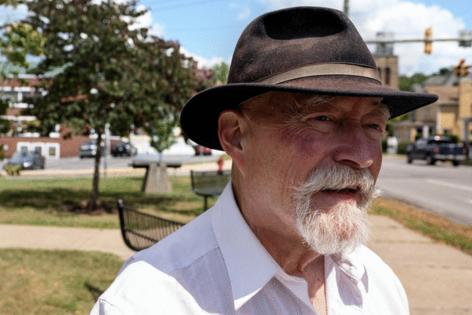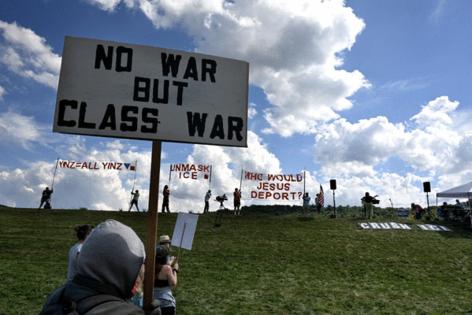Inside Pa.'s largest immigrant detention center: Violence, desperation, little oversight
Published in News & Features
Jose Francisco Velasquez Manaure views himself as a rule follower.
He was a police officer in his native Venezuela, where he joined an opposition political party to demand reforms in his country. When government-aligned paramilitary groups kidnapped others in his circle, he feared for his life. He fled his home and traveled thousands of miles through treacherous terrain to reach the Texas-Mexico border in July 2022.
Upon arrival, he requested asylum, trusting in a legal process that allows people like him, with a credible threat of political persecution, to live in the United States.
But that process has been upended this year amid President Donald Trump’s push to deport a record number of people. So when Velasquez was scheduled for a routine check-in with Immigration and Customs Enforcement officials in Philadelphia, his family and friends advised him to skip it.
He said he ignored their advice, telling them, “I’m going to follow the rules.”
That decision landed him in handcuffs and on a long bus ride from Philadelphia to the Moshannon Valley Processing Center, a remote holding facility run by the private prisons giant GEO Group. With capacity for nearly 1,900 prisoners, it is the largest detention center in the Northeast. Most people ICE picks up from New York to Maryland pass through the facility.
Since Aug. 1, Velasquez has lived in a confined space the size of a basketball court, sharing three toilets and six showers with 75 other men from around the world. Like Velasquez, the vast majority of those held in Moshannon have no criminal convictions in the U.S.
“It was the first time in my life I’d been detained,” Velasquez, 52, told reporters during an interview in Moshannon’s small, windowless visiting room.
Velasquez is one of more than a dozen detainees and immigration attorneys who told The Inquirer that life in the increasingly crowded facility is marked by uncertainty, violence, and desperation. Allegations of inhumane conditions there long predate Trump, but the facility’s population has reached all-time highs at the same time his administration has effectively eliminated outside oversight.
The Department of Homeland Security (DHS) all but dismantled its internal watchdog, the Office of Civil Rights and Civil Liberties (CRCL), which had opened an investigation into conditions at Moshannon under former President Joe Biden. That probe — into allegations of excessive force and abuses by guards, and inadequate medical and mental healthcare — was closed this year after Trump took office, and related documents are no longer visible on the DHS website.
Meanwhile, the nonprofit that provided know-your-rights training at Moshannon lost its federal contract to do so. And some detainees — who spoke with The Inquirer either by phone from the facility or after their release or deportation — report an ongoing practice of using solitary confinement as retaliation for filing grievances.
Even lawmakers have struggled to get a complete picture of life inside the facility. In late August, DHS prevented two Democrats — Pennsylvania Reps. Mary Gay Scanlon and Summer Lee — from entering Moshannon. Scanlon wrote to Homeland Security Secretary Kristi Noem on Aug. 27 that she continues to receive reports of inadequate medical care and insufficient food in Moshannon, and she raised concerns about the abrupt termination of the CRCL probe.
Noem has not responded to the letter, a spokesperson for Scanlon said. A DHS spokesperson did not address questions about those incidents but in May published a statement saying members of Congress must follow facility procedures and schedule tours in advance.
Witold Walczak, legal director of the ACLU of Pennsylvania, said reduced access has made monitoring conditions inside more difficult. He said he was not reassured by the DHS Office of Professional Responsibility’s most recent compliance inspection, dated from March, which found zero deficiencies at Moshannon — down from eight on the previous visit, during the Biden administration — and rated the facility as “superior.”
“Does anyone know what’s going on inside?” he asked. “The answer is, unfortunately, no.”
In a written statement to The Inquirer, ICE spokesperson Jason Koontz said that Moshannon adheres to strict rules for federal detention centers and that the agency is providing legal-rights education for detainees.
“The safety, security, and lawful treatment of every individual in custody remain paramount, and Moshannon Valley consistently meets or exceeds those federal benchmarks through regular inspections and continuous oversight,” Koontz wrote.
To Velasquez, the defining aspect of his confinement is the uncertainty, in an immigration system where the rules seem to change month by month.
In May, an appeals court ruled that immigration judges lack the authority to consider bond motions for anyone who crossed the border illegally. The number of people released from Moshannon on bond fell by half between April and July, according to ICE data collected by the Deportation Data Project.
Velasquez said some of his cellmates are considering voluntary deportation. But that’s not an option for Velasquez, who said he fears being killed if he returns to Venezuela.
“If my country was like theirs,” he said, “I’d be happy to go home, too.”
The prospect of spending months or a year at Moshannon, he said, causes many to lose hope. He is haunted by the memory of a Chinese national who rode on the bus with him from Moshannon to Philadelphia in early August.
He recalled the man, Chaofeng Ge, cracking jokes and smiling with another Chinese detainee — their humor transcending language and bringing the other passengers a small measure of relief on their long, uncomfortable journey through the Pennsylvania countryside. The two Chinese nationals were separated upon arrival at Moshannon and placed in cellblocks with few others who knew their language.
A few days later, Velasquez woke up to find the institution was locked down.
He heard that there had been a suicide in one of the showers. Ge was dead.
From coal country to prison town
From Route 322, outside Philipsburg, the Moshannon Valley Processing Center is obscured by a thicket of trees. As Velasquez arrived in August, the bus passed a blue sign for the facility that gave the impression of an industrial plant, and then rattled down a back road and into the sprawling barbed-wire compound.
Moshannon was built in 2004 to house low-security immigrants serving short federal sentences, and its construction was welcomed by area economic development boosters who saw it as a key component of the region’s turnaround after the demise of coal and other industries.
But in 2021, Biden signed an executive order banning federal private prison contracts, and the Bureau of Prisons flagged Moshannon for closure. ICE, in collaboration with Clearfield County, came up with a workaround: The county would act as a pass-through for the five-year, $264 million contract in return for a $200,000 annual cut.
To manage the rising population, Moshannon’s monthly operating expenses increased by half a million dollars from December to March, according to invoices obtained by The Inquirer under Pennsylvania’s Right to Know law.
It is part of a growing network of immigrant holding facilities that house more than 61,000 people nationwide. These facilities range from federal detention centers to county jails to “Alligator Alcatraz,” the infamous complex in the Florida Everglades.
According to ICE data, only about 20% of people booked into Moshannon this year have been convicted of serious crimes. Roughly 60% had either pending cases or no criminal convictions at all.
Allegations of violence have been a persistent issue since Moshannon’s reopening as an immigrant detention center, underscoring the need for independent oversight, advocates say. State troopers visited the facility 38 times between January 2024 and March 2025, according to dispatch data obtained by The Inquirer through an open-records request. The emergencies included reports of drug overdose, harassment, and trespassing — but nearly half of the visits were in response to reported assaults.
According to a 2022 DHS memo, civil rights groups alleged that the notorious MS-13 gang had taken over the facility and assaulted detainees, while the guards “stood by and did nothing.” Fights erupted with such regularity that some immigrants living at Moshannon would sleep in their shoes “in case they need to run and hide” in the middle of the night.
A spot check conducted by CRCL later that year identified dozens of serious issues, including excessive and dangerous uses of force by guards, insufficient staffing, and a high rate of sexual assaults. In response, ICE agreed to increase training on de-escalation and interpretation access, and to address camera blind spots that had contributed to the sexual assaults.
Since that probe began, GEO Group has enhanced security measures.
Sereyrath “One” Van, a Philadelphia man who was held at Moshannon in 2023 before being released and then returning there in August 2024, said GEO added additional razor-wire fencing and several new metal detectors after a violent melee in which three detainees were stabbed. Detainees now pass through security checkpoints twice a day.
Van said tensions have risen, too. He has seen the population spike from 1,180 to well over 1,600 at times, according to daily rosters posted in the kitchen, where he works for $1 a day.
“In here, cooler heads don’t prevail,” he said of the cramped conditions. “A lot of times, if they don’t stop fighting, the staff will mace them with pepper spray.”
Moshannon issues color-coded uniforms to designate threat levels. Velasquez received a blue polo shirt, issued to people who have civil immigration charges but no criminal records.
Ge, the detainee who died by suicide, had been given an orange shirt — an indication of his nonviolent criminal conviction for attempting to use a fake credit card at a CVS.
His death in custody last month became a flashpoint for immigrant rights groups, who descended on nearby Philipsburg for a protest on Aug. 23 to demand that the facility close.
In Philipsburg, Mayor John Streno greeted the activists warmly, hoping they would embrace the small-town charm. He credited Moshannon for helping power a revival of the walkable downtown, noting the brewery, the upscale coffee shop, and the serene town square edged by gracious Victorian-era homes.
Streno, 75, spent a decade as an officer inside Moshannon and now officiates weddings a few times each month in the visiting room, in front of a mural of a flower garden. Streno said that GEO Group jobs — with starting pay around $30 an hour, above the area’s median income, plus benefits — support as many as 200 households in his town of 1,400 families.
He said he is untroubled by Moshannon’s reputation or the growing proportion of detainees with no criminal record.
“I wish these people weren’t in the country to begin with. But since they are here, I’m glad we’re helping,” he said.
‘A black box’
Amid curtailed oversight, information about conditions in Moshannon is limited. Some detainees and attorneys say that’s intentional, and that those who complain have been threatened with retaliation.
One asylum-seeker from Myanmar, who has been in Moshannon for more than a year and a half, said he had repeatedly witnessed assaults and had been placed in the Segregated Housing Unit, or SHU, after filing grievances. He spoke on condition of anonymity to avoid further retaliation.
The use of solitary in retaliation for grievances was noted in a report on Moshannon by Temple University law students in 2024, and in interviews with lawyers.
Peter Alfredson, an attorney with the D.C.-based Amica Center for Immigrant Rights, said a woman reported that someone punched a hole in the wall of the women’s pod and detainees there grew anxious that it could be a peephole.
“They never fixed it,” Alfredson said. “Anyone who complained was threatened with solitary.”
ICE and Geo Group declined to comment on the use of segregated housing units at the facility and the reported hole in the women’s unit.
Detainees now have more limited access to the few legal resources that had once been available. The Trump administration cut $500,000 in federal contracts with the Pennsylvania Immigration Resource Center, which has served detainees at Moshannon for years, according to Ryan Brunsink, who heads the organization’s removal defense program.
PIRC successfully litigated to restore another $200,000 federal contract to represent people who are deemed incompetent due to intellectual disability, serious mental illness, or other cognitive issues.
The organization can still visit detainees in Moshannon, and in its statement ICE said it “continues to facilitate legal-rights education.” Brunsink said PIRC is allowed to conduct monthly trainings, and posts sign-up sheets in advance. But when he returned for the first time in May, after weeks of requesting his access be restored, he noticed that PIRC’s informational, know-your-rights materials were no longer posted.
He added that detainees who do not speak English or Spanish are especially vulnerable and might not have known the session was taking place.
“Those folks I’m particularly concerned about,” Brunsink said. “They’re more or less in a black box. There is no one contacting them.”
Indefinite confinement
As a processing center, Moshannon is designed for short stays.
But nearly one in five detainees has been there at least six months. Unlike federal criminal detention centers — which offer prisoners services like religious guidance, educational programs, and job training — Moshannon offers little programming to its growing population.
One former detainee — a 55-year-old man who was born in Romania and taken to Moshannon after receiving a pardon for a drug-trafficking case in Delaware — said he grew to yearn for the comforts of state prison. He asked to be referred to by his initials, J.B., because his case is still active and he fears retaliation.
“I would do 40 years in Delaware rather than sit for 15 months in immigration detention,” said J.B., who was released on bond in January. “At least in the prison I had a job. I had my own room. I had my TV and everything that I needed in my room.”
J.B. spent 15 months at Moshannon. Upon arriving, he experienced sticker shock. He said he paid $3 for a 20-minute phone call, and at the commissary, everything from ramen to roast beef was at least three times as expensive as it had been in state prison.
Tablets, used for legal research, messaging to friends and family, and watching videos, require detainees to pay to write an email, read a book, or see a movie.
For Van, the Philadelphia man born to Cambodian parents in a Thai refugee camp, the only relief from the stagnation on the crowded pod is daily shifts in the institution’s kitchen.
The U.S. government had previously tried and failed to deport Van after he served a prison term for drug dealing, but he was eventually released on parole. He never imagined he would be at Moshannon for more than a year without a bond hearing.
“I can prove I’m not a danger to the community. I’m not a flight risk,” he said. “I have a whole city that wants me out in the community and wants to give me a second chance.”
He is among a growing number of detainees who are effectively stateless. Several told The Inquirer they now live in fear of being dropped without due process in a strange country, such as South Sudan, or transferred to the notorious Salvadoran CECOT prison.
Among them is a man born in Senegal to French parents, who told The Inquirer he had begun a hunger strike to protest his indefinite incarceration.
The man, who asked not to be identified for fear of retaliation, said he had been convicted of theft and fraud in 2011. But because there was no place to deport him to, he had been free on supervision since then with no further arrests — until he was picked up in Maryland in April, due to what court records describe as “a change in immigration policy.”
He is ready to move to France, where his family lives, he said. But first he needs to get out of Moshannon.
“We’re both on the same page,” he said of the U.S. government. “We want me to move out of the U.S.”
‘Everyone told me not to go’
Before finding himself monitored by Moshannon’s guards, Velasquez spent decades on the other side of law enforcement in the Venezuelan capital, Caracas, as an administrative officer in a forensic police unit focused on white-collar crime.
Then, paramilitary groups began cracking down on the opposition political party he had joined, with threats, intimidation, violence, and extralegal detention.
“Once they take one person from your inner circle,” Velasquez recalled, “they start taking everyone.”
Velasquez made sure his two children got out of the country before making his own escape. In 2022, he and a group of 15 fellow police officers traveled across Colombia to the edge of the jungle and then embarked on a 21-day trek through the Darién Gap, the notoriously dangerous passage into Panama traveled by immigrants from around the world.
On the journey through seven countries, the officers encountered theft, extortion, and the final hazard of swimming the raging Rio Grande, where Velasquez said his documents were swept away. Only three of the officers reached the U.S. border together, he said.
There, immigration authorities put him on a bus to Washington. He then came to Philadelphia, where a Mennonite Christian couple found him a few days later in Chinatown, holding a sign that read “Don’t want money, looking for work.”
Robert Peters took Velasquez into his Mount Airy home for about two years. The former Mennonite minister and his wife set him up with construction work and fronted him money for an immigration lawyer. Velasquez paid them back while also wiring funds to his mother in Venezuela to help pay for food, his brother’s colon cancer treatment, and a nephew’s epilepsy medicine.
“He just became part of the fabric of our lives,” said Peters, 72. “He was paying income taxes, contributing to the local economy, trying to learn English, becoming part of the community.”
While other migrants Velasquez meets are desperate to leave Moshannon, he tries to appreciate each small measure of comfort there. For weeks, he read and reread the one Harry Potter book in Spanish he had inherited from another migrant. Recently, he finally got access to the library and switched to Don Quixote.
Even being trapped in Moshannon, he said, is better than deportation — which he considers a death sentence.
Recently, he heard from his family that a lifelong friend and neighbor had been deported.
“She made it back to Venezuela but never arrived home,” he said. “Her family had to mourn her with only a photo.”
©2025 The Philadelphia Inquirer, LLC. Visit at inquirer.com. Distributed by Tribune Content Agency, LLC.
















Comments